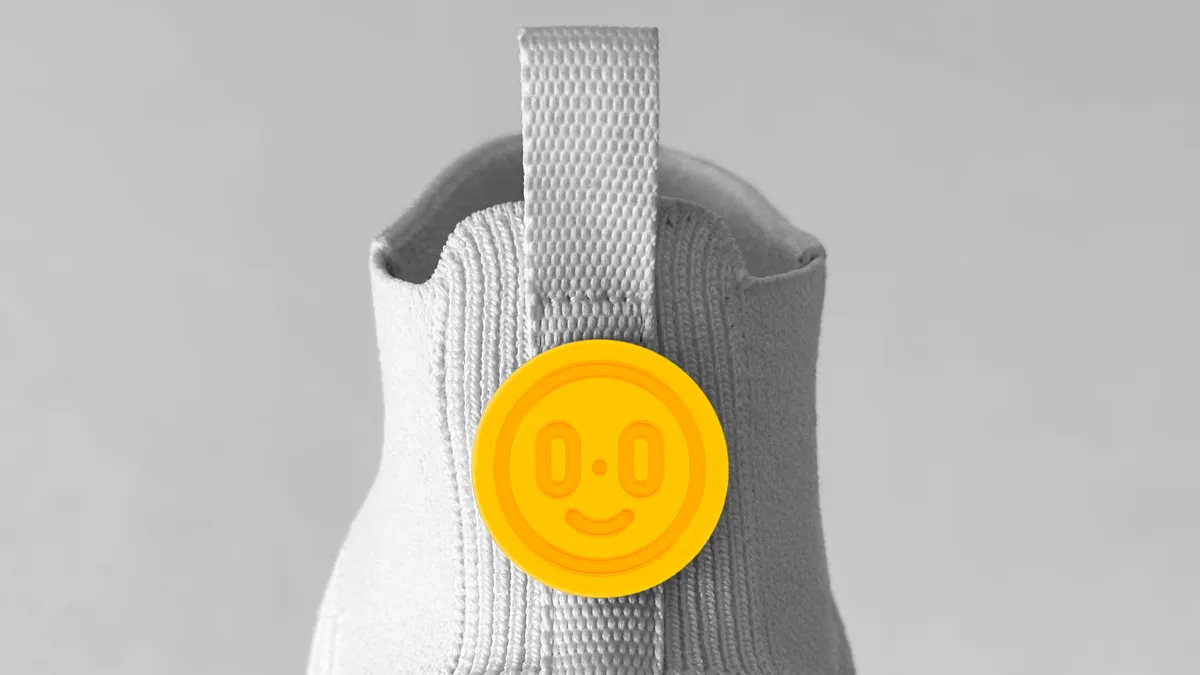Dive Brief:
-
Allbirds has made what it calls the first zero-carbon shoe, dubbed the “M0.0NSHOT.” The brand said it achieved this without relying on carbon offsets, which is when a company counteracts its own emissions by purchasing certificates linked to activities that lower carbon dioxide.
-
The new shoe uses carbon-negative materials such as merino wool, sugarcane-based foam and eyelets made of bioplastic that use a polymer formed from converted methane, according to a press release shared with Retail Dive. Allbirds worked with a regenerative wool program to source wool from Lake Hawea Station in New Zealand.
- Allbirds will first show the shoe in June at the Global Fashion Summit in Copenhagen. The product has a footprint of 0.0 kilograms CO2e versus an industry average of 14 kilograms (about 30 pounds) CO2e, according to the brand.
Dive Insight:
Allbirds is working off the momentum it started through its partnership with Adidas in 2020, when it created what it called the lowest-carbon footprint shoe at the time.
“We believe this will revolutionize the path to net zero and act as rocket-fuel for the entire industry. We could spend decades debating the finer points of carbon sequestration, or we can innovate today with a common sense approach,” Hana Kajimura, head of sustainability at Allbirds, said in a statement. “It’s about progress, not perfection. The scientists have shown us what’s possible — now it’s time for the fashion industry to carry the open-sourced learnings from M0.0NSHOT forward.”
The brand is also open-sourcing a toolkit that outlines how it got Moonshot to net zero, which will be more so like a plan for brands to work with Allbirds on utilizing the innovation, co-CEO and co-founder Tim Brown told Retail Dive.
As the shoe is not commercially available yet, Allbirds has not settled on a price for the product, according to Brown, though the brand is conscious of the higher prices often associated with sustainability-focused products.
“Quite frankly, we haven't landed on a specific price here,” Brown added. “I think we will offer value here. And when we sell that, when we get to the point of selling this product, that won't be for some astronomical marked-up price. This will be about accessible pricing. And maybe it's a little bit more expensive than the other things that we make because of the various pieces that we're putting together.”
The brand plans to eventually use the methodology and manufacturing processes from the Moonshot in its other products, particularly the regenerative wool aspect.
The Moonshot shoe’s carbon footprint is determined using the brand’s life cycle assessment tool calculator, which the company created to determine the footprint of all its products and has made it publicly accessible for other brands to use. However, the tool — which was third-party verified against ISO 14067 requirements when first created — was modified for the Moonshot because its footprint deviates from standards by accounting for on-farm carbon sequestration and emissions. ISO 14067 is a set of principles, requirements and guidelines from the International Organization for Standardization for the quantification and reporting of the carbon footprint of a product.
The executive acknowledged that the brand is stepping into new territory with this release, but the company still stands behind the science used in Moonshot’s development.
“That's not to say that there aren't different ways of interpreting this, and different debates that you could have on indirect land usage and the methodologies that underpin our frameworks,” Brown said. “But we've been really transparent with this. And in the absence of anyone else having done this before, we're trying to show leadership here.”
While Allbirds has prided itself on creating more sustainable products, its earnings haven’t demonstrated that consumers are spending on its lineup of offerings.
The brand’s CFO Mike Bufano announced earlier this month that he was exiting the brand, with plans to stay through mid-May. During its end-of-year earnings report this month, the brand also announced it was scaling back its store opening plans, opening just three stores this year compared to the 19 it opened in 2022. Its Q4 earnings report showed net revenue fell by 13.4% year over year to $84.2 million, and net loss grew by 138% to $24.9 million.















